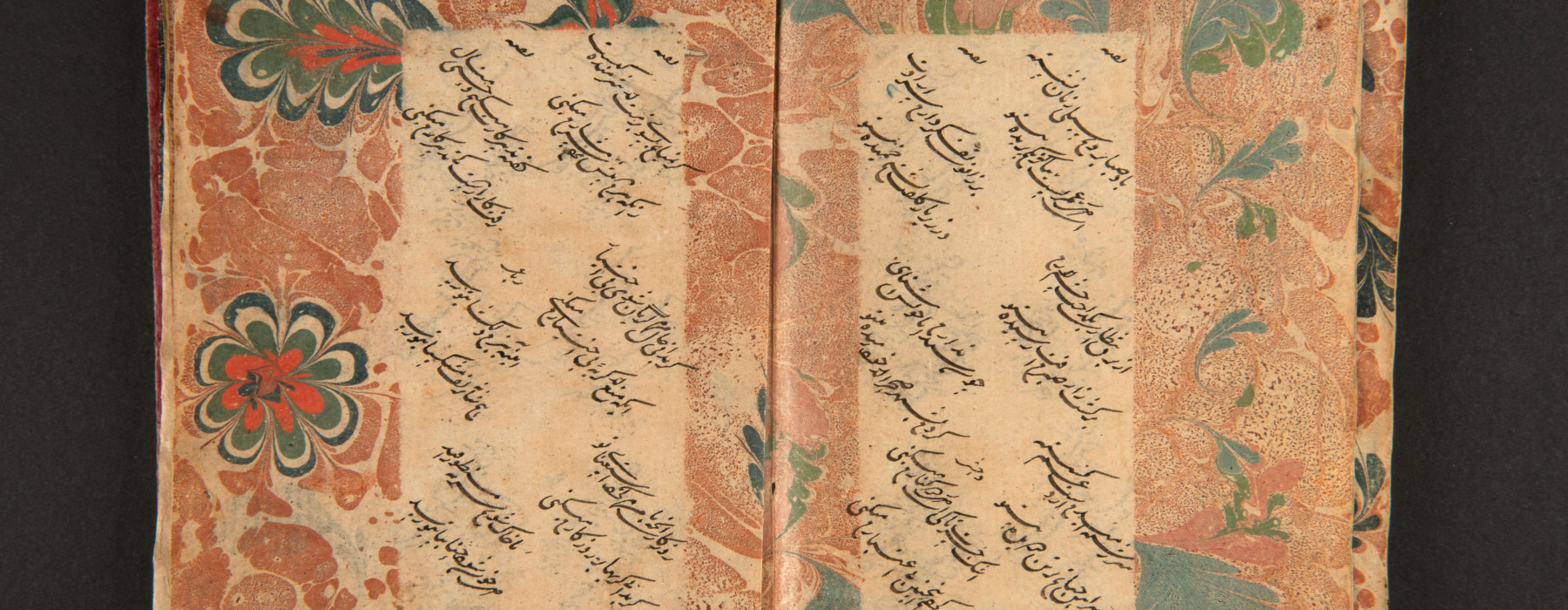The heart speaks through the poems, objects, and contemporary art presented in the exhibition. The emotions explored range from betrayal to passion, from displacement to love for one’s homeland.
The artwork Qatalogue (2018, Berlin) by the Slavs and Tatars art collective features a tongue curled around Cyrillic letters such as Қ (kh), Ћ (th), Ҩ (w), Ѫ (q), and Ҙ (th). The piece portrays the confusion and uncertainty experienced by many in Central Asia upon becoming part of the Soviet Union. Languages such as Tajik, Uzbek, and Turkmen suddenly had to be written in a new script: Cyrillic.
Many poems featured in Poetry of the People are still read and studied, even within Dutch society. On her upcoming album, set to be released in September this year, Meral Polat sings a song based on the poem Ötme Bülbül Ötme by poet, musician, humanist, and mystic Pir Sultan Abdal, a key figure in Alevism. Abdal advocated for the rights of the people and resisted the Ottoman Empire. In a video, Meral Polat performs the poem in song.
I became like rivers
separated from the sea
I became like ashes
of an extinguished fire
I became like roses
that bloomed before their time
I'm burning, my friend,
from the pain you caused me
[Pir Sultan Abdal, Ötme Bülbül Ötme, 16e eeuw, fragment]
The work Roots in the Sky by Nour Jaouda, which was also displayed at last year’s Venice Biennale, explores themes of national identity, resilience, and destruction. The piece embodies memories of her grandmother’s garden in Benghazi, Libya. Roots in the Sky consists of layers and shapes that have been cut out and sewn together again, much like the way our memory stitches together our experiences. The title refers to a line from the poem The Second Olive Tree by poet Mahmoud Darwish.
These soldiers, these modern soldiers
Besiege her with bulldozers and uproot her from her lineage
Of earth. They vanquished our grandmother who foundered,
Her branches on the ground, her roots in the sky.
[Mahmoud Darwish, The Second Olive Tree, ca. 2007, fragment]
Mahmoud Darwish (Palestine, 1941-2008) is one of the most celebrated Palestinian poets. His versatile poetic voice conveys themes of Palestinian displacement, resistance, and love for the homeland. In his poetry, the olive tree symbolises resilience and hope. Deeply rooted in the soil, it also serves as a metaphor for a shared national identity. In a 1983 recital, Darwish moved members of the Palestinian National Council to tears – a poignant moment in the lead-up to the Iranian Revolution.
I saw myself as a mirror devoid of myself
At any moment an image falls upon it by your hand
Sometimes the image of your power, sometimes your tyranny
And sometimes the image of your self-worshipping eyes
[Forough Farrokhzad, Servitude, 1958, fragment]
In the twentieth century, when few women gained respect as poets, Iranian poet Forough Farrokhzad (1934-1967) explored taboo subjects. Her often controversial poetry expressed physical and emotional intimacy, making her a symbol of change in contemporary Iran. Her work continues to inspire Iranians worldwide.
To live like a tree alone and free
And like a forest in fraternity
This longing is ours
[Nâzım Hikmet Ran, Kuvayi Milliye Destanı - (“8. Bap”), 1939-1941, fragment]
The poems of Nâzım Hikmet Ran (1902-1963) resound with loud protest. Due to his communist ideologies, he spent 28 years in prison. After his release, he fled his homeland. Even in captivity, Nâzım Hikmet continued to fight for freedom through his poetry. To this day, he is regarded as the first and foremost modern Turkish poet and one of the greatest international poets of the twentieth century. The exhibition features images from the 2013 Gezi Park protests, where lines from Hikmet’s poetry were displayed on banners.
Poetry of the People can be visited – and experienced – at Wereldmuseum Amsterdam from 14 February up and till 24 August 2025.
